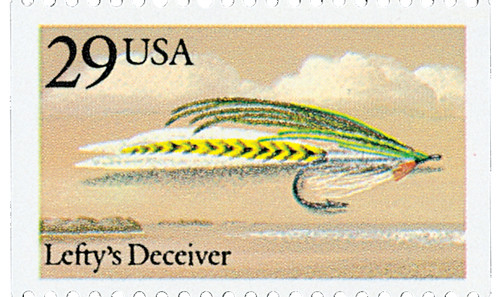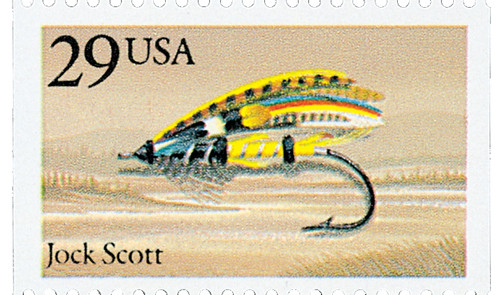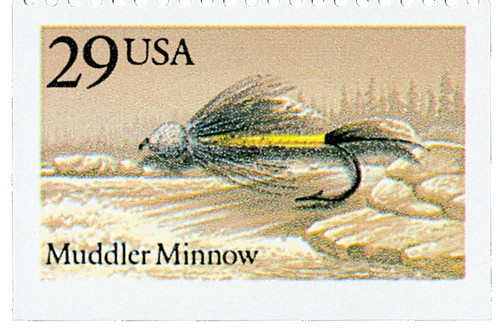
# 2548 - 1991 29c Fishing Flies: Lefty's Deceiver
US #2548
1991 Left’s Deceiver
- Part of the Fishing Flies set of 5
Category of Stamp: Commemorative
Set: Fishing Flies
Value: 29¢, First Class Mail Rate
First Day of Issue: May 31, 1991
First Day City: Cuddebackville, New York
Quantity Issued: 150,711,600
Printed by: American Bank Note Company
Printing Method: Photogravure
Format: Booklet: 4 panes of 5, from printing cylinders of 275 subjects (11 across, 25 down)
Perforations: 11
Reason the stamp was issued: This stamp appeals to those interested in fly fishing. This was one of the fastest growing sports at the time.
About the stamp design: The Fishing Flies stamps picture five different flies. These are a small portion of the 1,200 patterns of flies. Chuck Ripper, a wildlife artist created the images for the stamps. He had previously designed the 1986 Fish booklet stamps and thought of the idea of showing the flies used to catch the fish. Each fishing fly depicted on these stamps has a background showing a scene typical of where it would be used. Ripper used actual flies as his models for the artwork. The Fishing Flies shown are: Royal Wulff, Jock Scott, Apte Tarpon Fly, Lefty’s Deceiver, and Muddler Minnow
Special design details: The stamps were produced as a five-variety topical booklet. The USPS began producing these in 1985.
First Day City: The First Day of Issue ceremony was held at the Never Sink Valley Area Museum in Cuddebackville, New York. This area is known for its trout fishing.
About the Fishing Fly set: The stamps were produced as a five-variety topical booklet. The USPS began producing these booklets in 1985. Fly fishing is a popular sport among anglers because of the extra skill needed to do it well.
History the stamp represents: Lefty’s Deceiver – This fly was created by Lefty Kreh, while fishing for striped bass in the Chesapeake Bay. It was designed to look like smelt, a common food of the bass. The fly has become popular among saltwater fly fishermen, and is made in varying colors based on the forage fish a larger fish may eat.
US #2548
1991 Left’s Deceiver
- Part of the Fishing Flies set of 5
Category of Stamp: Commemorative
Set: Fishing Flies
Value: 29¢, First Class Mail Rate
First Day of Issue: May 31, 1991
First Day City: Cuddebackville, New York
Quantity Issued: 150,711,600
Printed by: American Bank Note Company
Printing Method: Photogravure
Format: Booklet: 4 panes of 5, from printing cylinders of 275 subjects (11 across, 25 down)
Perforations: 11
Reason the stamp was issued: This stamp appeals to those interested in fly fishing. This was one of the fastest growing sports at the time.
About the stamp design: The Fishing Flies stamps picture five different flies. These are a small portion of the 1,200 patterns of flies. Chuck Ripper, a wildlife artist created the images for the stamps. He had previously designed the 1986 Fish booklet stamps and thought of the idea of showing the flies used to catch the fish. Each fishing fly depicted on these stamps has a background showing a scene typical of where it would be used. Ripper used actual flies as his models for the artwork. The Fishing Flies shown are: Royal Wulff, Jock Scott, Apte Tarpon Fly, Lefty’s Deceiver, and Muddler Minnow
Special design details: The stamps were produced as a five-variety topical booklet. The USPS began producing these in 1985.
First Day City: The First Day of Issue ceremony was held at the Never Sink Valley Area Museum in Cuddebackville, New York. This area is known for its trout fishing.
About the Fishing Fly set: The stamps were produced as a five-variety topical booklet. The USPS began producing these booklets in 1985. Fly fishing is a popular sport among anglers because of the extra skill needed to do it well.
History the stamp represents: Lefty’s Deceiver – This fly was created by Lefty Kreh, while fishing for striped bass in the Chesapeake Bay. It was designed to look like smelt, a common food of the bass. The fly has become popular among saltwater fly fishermen, and is made in varying colors based on the forage fish a larger fish may eat.














